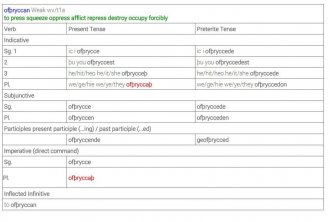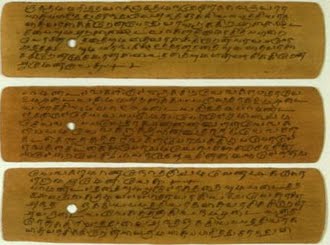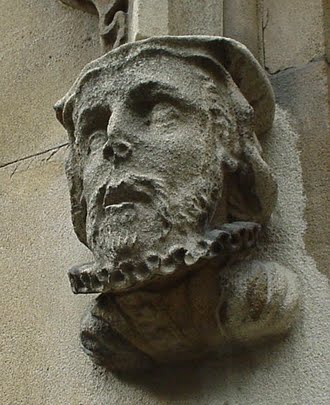
 Help me keep this site free and ad-free; please donate now and help me cover my costs:
Help me keep this site free and ad-free; please donate now and help me cover my costs:
To use the translator, all you have to do is Click on the 'Translator' button on the left and type (or copy/paste) a word into the area to the right of "Word to translate" and click / press the 'To Modern English' button and the results will then be displayed.
Note - accents should take the form é not ē . Words can be entered directly including æ þ ð characters EG ofþryccaþ. Alternatively .ae will be substituted with æ.th with þ, and .dh with ð. So ofþryccaþ could be written of.thrycca.th
For example, if you paste in the word: ofþryccaþ and click on the 'To Modern English' button, you get the following results:
You can see that ofþryccaþ is derived from ofþryccan and relates to the present indicative plural case and the Imperative plural case.
If you paste in the word: éðelcyninges, you get the following results:
You can see that the supplied word is in red and is in the genitive singular.
Modern English to Old English.
To use the translator, all you have to do is Click on the Translator link on the left and type (or copy/paste) a word into the area to the right of "Word to translate" and click / press the 'To Old English' button. The Old English equivalent of Modern English words where the search word is found is the description are shown.
 For example, type 'land' in and click on 'Modern English to Old English'!
For example, type 'land' in and click on 'Modern English to Old English'!
Old English Grammar
When reading the comments people make about this site probably the most common is that some users have no understanding of Old English Grammar and a common question is, for nouns, what does Nominative, Accusative, Genitive and Dative mean?
The following is an attempt to explain in simple terms what these words mean. There are many books written on this subject and they provide a much greater depth of accuracy and understanding than I can here.
Having said that, here goes:
Nouns.
Nouns are things - like King, sword and horse. In modern English we usually only change (inflect) the endings of nouns to indicate possession and for the plural case. EG.
- The King's crown ( 's indicates possession)
- The Kings came to London (s on the end implies plural - IE many kings)
- Nominative: The nominative case is used for the subject of a sentence.
- Accusative: The accusative case is used for the object of the sentence.
- Genitive: The genitive case is used to indicate possession.
- Dative: The dative case is used for the indirect object of the sentence.
The King killed the slave. King is the subject of the sentence - therefore nominative case and would be translated cyning.
The slave killed the King. King is the object of the sentence - therefore accusative case and would be translated cyning. (Note for the noun 'King' - there is no difference in the inflections for Nominative or Accusative).
The King's crown was red. King is in a possessive sense and therefore genitive case and would be translated cyninges.
The slave rode his horse with the King. King is the indirect object of the sentence - therefore dative case and would be translated cyninge
There are many ways in which the nouns change their endings (inflect) for each of these cases and it is beyond the scope of this page to explain them all. Trying to encapsulate them in a computer program was hard - trying to explain them would be even harder!
MORE TRANSLATION VIDEO




 Tamil (தமிழ், tamiḻ, [t̪ɐmɨɻ] , alternative spelling: Thamizh) is a Dravidian language spoken predominantly by Tamil people of the Indian subcontinent. It has official status in the Indian state of Tamil Nadu and in the Indian union territory of Puducherry. Tamil is...
Tamil (தமிழ், tamiḻ, [t̪ɐmɨɻ] , alternative spelling: Thamizh) is a Dravidian language spoken predominantly by Tamil people of the Indian subcontinent. It has official status in the Indian state of Tamil Nadu and in the Indian union territory of Puducherry. Tamil is...
 William Tyndale (sometimes spelled Tynsdale, Tindall, Tindill, Tyndall; c. 1492 – 1536) was an English scholar who became a leading figure in Protestant reform in the years leading up to his execution. He is remembered for his translation of the Bible into English...
William Tyndale (sometimes spelled Tynsdale, Tindall, Tindill, Tyndall; c. 1492 – 1536) was an English scholar who became a leading figure in Protestant reform in the years leading up to his execution. He is remembered for his translation of the Bible into English...








